Silkies are one of the most misunderstood chicken breeds. There are many false facts floating around about them, so I'm going to try to set them strait.
1. Silkie or Silky?
Their is often a lot of confusion here. The true name is silkie, but if you call them silky most people will understand. Silkies used to be called the Chinese Silk Chicken or the Japanese Silky, but it was replaced with silkie, probably because it can not be confirmed where the breed is actually from. It is supposed that they came from either China or Japan, but Europe is also an option because people have kept silkies there for hundreds of years. Personally, I believe they came from somewhere in Asia, probably China.

2. Silkies have fur
No, silkies do not have fur. To understand this, you need to understand the normal chicken's feathers (or "hard feathers," as they are sometimes called).


Hard feathers (left) compared to silkie feathers (right).
To keep it simple, the stick-like part of the feather is the 'shaft.' The fluffy strands that stick out of it are called many different names; the vanes, the web, the surface, etc. Here we'll be called them the vanes. Anyways, each individual vane is held to the others by microscopic barbs. Now, the only difference between the normal chicken feather and a silkie feather is that the silkie feather lacks barbs, giving it the look and feel of fur. Because of this, silkie feathers are not waterproof.
Now you can say you know more than Marco Polo! During his travels in Asia in the 13th century, Marco Polo once mentioned in his writing that he had seen a "furry chicken".
Though it seems unbelievable, Dutch traders used to sell silkies as "a cross between a chicken and a rabbit". Crazy, right? But I promise, silkies are real chickens!
3. Silkies are less smart than other chickens
Many people claim this myth is true. This is probably the most famous silkie myth. But anybody who has kept silkies for multiple years will know that silkies are no less smart than other chickens.
One silkie keeper, @Hinotori, said: "It's the crests. If they can't see they walk into stuff and don't react quickly. I can take bumbling hens with big crests and put them in ponytails. Their assertiveness totally changes once they can see."
I absolutely agree. If you don't plan on showing your silkies, you can trim their crests around their eyes. If you do want to show them, you will probably want to try pulling the crest back with a ponytail holder or something similar.
I believe that chickens, like humans, vary in their intelligence, but not according to breed. Some individuals are smart, others are not so smart. It depends on the chicken. So if you ask experienced silkie keepers, silkies are just as smart as other breeds of chickens.

4. Silkie roosters crow less than roosters of other breeds
False. Silkie roosters crow just as much as other roosters. There is also the rumor that they are quieter than other breeds. Well, if you have a large-fowl rooster and a bantam rooster, which do you think will be louder? So to put it this way, silkies are average loud crowers for bantams.
But, silkie roosters tend to be more mellow. Notice that I say tend and not are. You can still get an aggressive one, it is just more uncommon than in other breeds.
7. Silkies are bad layers
Partial myth. I have found my lesser-quality silkies to be great, reliable layers. But my better quality birds aren't as consistent, because they have been breed for quality and not egg laying abilities.
I think the real problem is that silkie eggs are small, like all bantam eggs. Some people say you need two bantam eggs for every large-fowl egg, but I have found that four bantam eggs for every three normal eggs is more realistic. Bantam egg yolks are almost the same size as large fowl eggs, but there is less eggwhite. Because of this, we like to boil our bantam eggs.
Or the reason for this myth could be because when a hen is broody, they don't lay eggs. Silkies tend to go broody a lot, and therefore lay you less eggs.

6. Silkies don't get along with other breeds
Once again, a partial myth. I keep my silkies in a mix-breed flock with all sorts of large-fowl and bantams and do fine, but if you introduce say one or two silkies to a large flock of Rhode Island Reds or Barred Plymouth Rocks, you might have some problems. Chickens, like humans, tend to pick on those who are different. Think of school, for example.
I recommend never keeping only one silkie. You should have at least two, preferably three. I typically have several silkies and several other breeds in one brood.
Crests can matter here to. If you silkie can't see where to run or how to defend herself, she is going to get pecked a lot. If you are integrating silkies into an existing flock, please make sure they can see beyond their own fluff.
7. Silkie roosters don't give alarms for predators
Again, crests. If silkies can't see the predators, they can't give the alarm. But when they can see, my silkie roosters give alarms reliably. Several times my roosters have saved my hens from hawks, one example being my story here: https://www.backyardchickens.com/threads/roos-saved-the-hens-from-hawk.1417269/#post-23279130

8. It is impossible to sex silkies until they crow or lay an egg
Myth. Silkies are trickier to sex than other breeds, but it's not impossible.
Some people claim they have had obvious "rooster" silkies who ended up laying an egg, or female-like silkies who suddenly ended up mating the hens, but I have never had a tricky one. I know their genders for sure by the age of four months. I'm not saying it is impossible, just uncommon.
But you do have to wait longer to figure out their gender than you do with other breeds. Where as in most breeds roosters become obvious at around six weeks, silkies have to be closer to three months.
There are several ways to tell the gender of silkies. Comb growth, streamers, crest shape, posture, and more. But if you want to find out more about this, check out this other article: Sexing Silkies
9. Silkies don't sleep on roosts or fly
Another partial truth. Due to their feather structure, silkies cannot get the lift they need to fly. However, most silkies have at least a couple hard feathers on their wings, and hatchery silkies typically have quite a few hard feathers. So the better quality silkie you have, the worse they're going to be at flying. But yes, some silkies can fly several feet high. You can prevent this by clipping their wings, though this is not recommended if you plan on showing them.
But lots of silkies have had the instinct to fly breed out of them. My silkies have less of a desire to escape the chicken yard than, say, my Old English Game bantams. This is sometimes phrased as "they do good in confinement".
As for roosts, some of my silkies sleep on them, some don't. They prefer low roosts, and for show quality birds you need extra low roosts. All my silkies can get onto the roosts, but some are just too lazy to do so. If the floor is clean, I have no problem with them sleeping on the floor. But if you want them to sleep on the roost you can lift them up every night.
10. Silkies look like dust mops
Well, this is up to you. I think they look like cute dust mops! But if you want to see them another way, that's okay.
11. Silkies don't do good in winter
Myth. My silkies do just fine in winter; actually, the heat bothers them more than the cold. I believe silkies do just as good in winter as your typical chicken. As long as they are dry and the coop is well ventilated, the chickens will be fine (see more here: How To Overwinter Chickens Naturally).

Silkie with a wet crest
The only problem (in my experience) with silkies in winter is the snow. As mentioned before, silkie feathers are not waterproof. If they are wet, they will be cold. You would too! I blow-dry my silkies before cold nights if they are soaked through. You could also keep them in a covered run or coop.
12. Silkies require extra work
Sort of. Some silkies do need their crest to be trimmed (which only takes a few minutes), but you only do that once, possibly twice a year. They might also need their fourth and fifth toe to be clipped every once in a while. And as mentioned above, they need to be kept dry in the winter.
Some people clean their silkies feathered feet of gunk often. They are ornamental fowl and may need extra maintenance if you want to keep them looking in top shape. My silkies free-range, but I only clean their feet occasionally.
When you show any chicken, they will need a bath. Bathing silkies is different from most breeds, but easy. @Fur-N-Fowl wrote a great article on the subject here: Bathing Silkies: How To Keep Them Bright & Fluffy!
But as @LynnaePB pointed out, silkies are easier to contain in a pen then other breeds as they don't fly super well, and they are pretty mellow which makes them easier to treat worms or external parasites.
13. Silkies are more susceptible to disease
I have raised many silkies and only had one genetic problem (wry neck) and a bit of splayed leg in chicks (but that was because of high temps in the incubator), but others have had many silkie problems in their flock. I think it depends on the stock, and sometimes the way they were raised, but mostly the stock. I got my first silkies from Cackle, and for many years I have been building my flock's immune system by feeding healthily and naturally.
Research your stock, and ask for others opinions of where they got their silkies.
14. Silkies are calmer and more gentle than other breeds
True! Well, mostly. You still need to work with them and gentle them, but they tame very easily and quickly. Because of this they do great with children!
It could partially be because of their crests. If they can't see you, they can't run from you. But a lot of their calmness is because it has been bred into them.
I'm not saying you won't get a wild one. Without time and gentle handling, your silkies can be as wild as any breed. But, it can come down to the bird. Not all chickens are meant to be cuddlebuddies.
15. Silkies make great mothers
True, true, true! Silkies are one of the best mothering breeds you can find!

Two silkie mamas with their chicks
But once again, it depends on the bird. Some chickens just aren't meant to be mothers, and others won't stop going broody. Often times, chickens from hatcheries have had some the mothering instinct bred out of them. But I do not mean to say that silkies from hatcheries won't go broody; it really comes down to the bird.
16. Silkies are amazing and make great pets!
True! I love my silkies, they are so friendly and cute. If you want some snuggle-chickens, I recommend silkies! If you want pets for your kids, I recommend silkies! If you want special and unique chickens, I recommend silkies!
If you want to chat with other silkie keepers or have silkie-specific questions, check out this thread: https://www.backyardchickens.com/threads/silkies-they’re-simply-spectacular.1334299/#post-21797229
I hope this article helps you understand the world of silkies better! Have fun chickening!
Any other silkie myths you have heard? Please comment below or send me a PM!
1. Silkie or Silky?
Their is often a lot of confusion here. The true name is silkie, but if you call them silky most people will understand. Silkies used to be called the Chinese Silk Chicken or the Japanese Silky, but it was replaced with silkie, probably because it can not be confirmed where the breed is actually from. It is supposed that they came from either China or Japan, but Europe is also an option because people have kept silkies there for hundreds of years. Personally, I believe they came from somewhere in Asia, probably China.
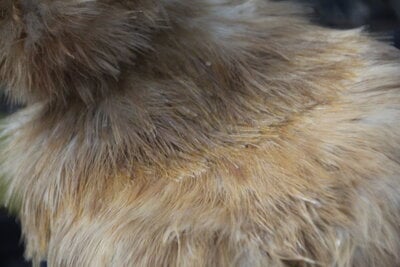
2. Silkies have fur
No, silkies do not have fur. To understand this, you need to understand the normal chicken's feathers (or "hard feathers," as they are sometimes called).
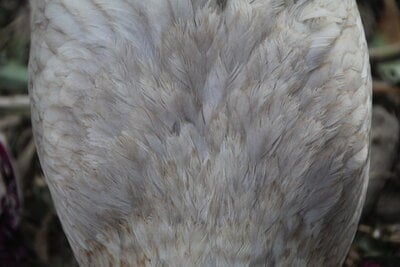
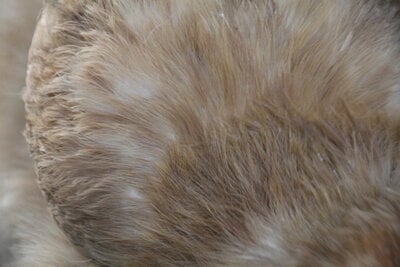
Hard feathers (left) compared to silkie feathers (right).
To keep it simple, the stick-like part of the feather is the 'shaft.' The fluffy strands that stick out of it are called many different names; the vanes, the web, the surface, etc. Here we'll be called them the vanes. Anyways, each individual vane is held to the others by microscopic barbs. Now, the only difference between the normal chicken feather and a silkie feather is that the silkie feather lacks barbs, giving it the look and feel of fur. Because of this, silkie feathers are not waterproof.
Now you can say you know more than Marco Polo! During his travels in Asia in the 13th century, Marco Polo once mentioned in his writing that he had seen a "furry chicken".
Though it seems unbelievable, Dutch traders used to sell silkies as "a cross between a chicken and a rabbit". Crazy, right? But I promise, silkies are real chickens!
3. Silkies are less smart than other chickens
Many people claim this myth is true. This is probably the most famous silkie myth. But anybody who has kept silkies for multiple years will know that silkies are no less smart than other chickens.
One silkie keeper, @Hinotori, said: "It's the crests. If they can't see they walk into stuff and don't react quickly. I can take bumbling hens with big crests and put them in ponytails. Their assertiveness totally changes once they can see."
I absolutely agree. If you don't plan on showing your silkies, you can trim their crests around their eyes. If you do want to show them, you will probably want to try pulling the crest back with a ponytail holder or something similar.
I believe that chickens, like humans, vary in their intelligence, but not according to breed. Some individuals are smart, others are not so smart. It depends on the chicken. So if you ask experienced silkie keepers, silkies are just as smart as other breeds of chickens.
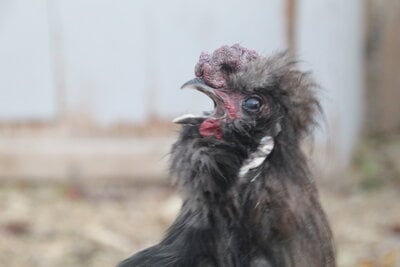
4. Silkie roosters crow less than roosters of other breeds
False. Silkie roosters crow just as much as other roosters. There is also the rumor that they are quieter than other breeds. Well, if you have a large-fowl rooster and a bantam rooster, which do you think will be louder? So to put it this way, silkies are average loud crowers for bantams.
But, silkie roosters tend to be more mellow. Notice that I say tend and not are. You can still get an aggressive one, it is just more uncommon than in other breeds.
7. Silkies are bad layers
Partial myth. I have found my lesser-quality silkies to be great, reliable layers. But my better quality birds aren't as consistent, because they have been breed for quality and not egg laying abilities.
I think the real problem is that silkie eggs are small, like all bantam eggs. Some people say you need two bantam eggs for every large-fowl egg, but I have found that four bantam eggs for every three normal eggs is more realistic. Bantam egg yolks are almost the same size as large fowl eggs, but there is less eggwhite. Because of this, we like to boil our bantam eggs.
Or the reason for this myth could be because when a hen is broody, they don't lay eggs. Silkies tend to go broody a lot, and therefore lay you less eggs.
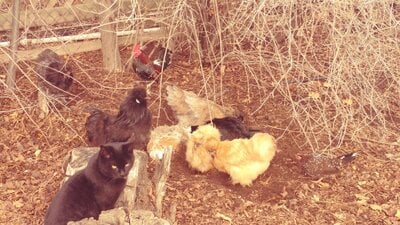
6. Silkies don't get along with other breeds
Once again, a partial myth. I keep my silkies in a mix-breed flock with all sorts of large-fowl and bantams and do fine, but if you introduce say one or two silkies to a large flock of Rhode Island Reds or Barred Plymouth Rocks, you might have some problems. Chickens, like humans, tend to pick on those who are different. Think of school, for example.
I recommend never keeping only one silkie. You should have at least two, preferably three. I typically have several silkies and several other breeds in one brood.
Crests can matter here to. If you silkie can't see where to run or how to defend herself, she is going to get pecked a lot. If you are integrating silkies into an existing flock, please make sure they can see beyond their own fluff.
7. Silkie roosters don't give alarms for predators
Again, crests. If silkies can't see the predators, they can't give the alarm. But when they can see, my silkie roosters give alarms reliably. Several times my roosters have saved my hens from hawks, one example being my story here: https://www.backyardchickens.com/threads/roos-saved-the-hens-from-hawk.1417269/#post-23279130
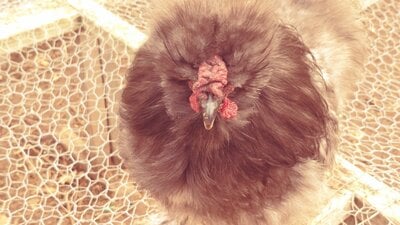
8. It is impossible to sex silkies until they crow or lay an egg
Myth. Silkies are trickier to sex than other breeds, but it's not impossible.
Some people claim they have had obvious "rooster" silkies who ended up laying an egg, or female-like silkies who suddenly ended up mating the hens, but I have never had a tricky one. I know their genders for sure by the age of four months. I'm not saying it is impossible, just uncommon.
But you do have to wait longer to figure out their gender than you do with other breeds. Where as in most breeds roosters become obvious at around six weeks, silkies have to be closer to three months.
There are several ways to tell the gender of silkies. Comb growth, streamers, crest shape, posture, and more. But if you want to find out more about this, check out this other article: Sexing Silkies
9. Silkies don't sleep on roosts or fly
Another partial truth. Due to their feather structure, silkies cannot get the lift they need to fly. However, most silkies have at least a couple hard feathers on their wings, and hatchery silkies typically have quite a few hard feathers. So the better quality silkie you have, the worse they're going to be at flying. But yes, some silkies can fly several feet high. You can prevent this by clipping their wings, though this is not recommended if you plan on showing them.
But lots of silkies have had the instinct to fly breed out of them. My silkies have less of a desire to escape the chicken yard than, say, my Old English Game bantams. This is sometimes phrased as "they do good in confinement".
As for roosts, some of my silkies sleep on them, some don't. They prefer low roosts, and for show quality birds you need extra low roosts. All my silkies can get onto the roosts, but some are just too lazy to do so. If the floor is clean, I have no problem with them sleeping on the floor. But if you want them to sleep on the roost you can lift them up every night.
10. Silkies look like dust mops
Well, this is up to you. I think they look like cute dust mops! But if you want to see them another way, that's okay.
11. Silkies don't do good in winter
Myth. My silkies do just fine in winter; actually, the heat bothers them more than the cold. I believe silkies do just as good in winter as your typical chicken. As long as they are dry and the coop is well ventilated, the chickens will be fine (see more here: How To Overwinter Chickens Naturally).
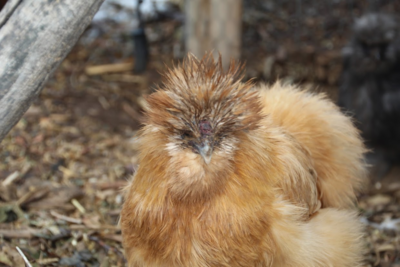
Silkie with a wet crest
The only problem (in my experience) with silkies in winter is the snow. As mentioned before, silkie feathers are not waterproof. If they are wet, they will be cold. You would too! I blow-dry my silkies before cold nights if they are soaked through. You could also keep them in a covered run or coop.
12. Silkies require extra work
Sort of. Some silkies do need their crest to be trimmed (which only takes a few minutes), but you only do that once, possibly twice a year. They might also need their fourth and fifth toe to be clipped every once in a while. And as mentioned above, they need to be kept dry in the winter.
Some people clean their silkies feathered feet of gunk often. They are ornamental fowl and may need extra maintenance if you want to keep them looking in top shape. My silkies free-range, but I only clean their feet occasionally.
When you show any chicken, they will need a bath. Bathing silkies is different from most breeds, but easy. @Fur-N-Fowl wrote a great article on the subject here: Bathing Silkies: How To Keep Them Bright & Fluffy!
But as @LynnaePB pointed out, silkies are easier to contain in a pen then other breeds as they don't fly super well, and they are pretty mellow which makes them easier to treat worms or external parasites.
13. Silkies are more susceptible to disease
I have raised many silkies and only had one genetic problem (wry neck) and a bit of splayed leg in chicks (but that was because of high temps in the incubator), but others have had many silkie problems in their flock. I think it depends on the stock, and sometimes the way they were raised, but mostly the stock. I got my first silkies from Cackle, and for many years I have been building my flock's immune system by feeding healthily and naturally.
Research your stock, and ask for others opinions of where they got their silkies.
14. Silkies are calmer and more gentle than other breeds
True! Well, mostly. You still need to work with them and gentle them, but they tame very easily and quickly. Because of this they do great with children!
It could partially be because of their crests. If they can't see you, they can't run from you. But a lot of their calmness is because it has been bred into them.
I'm not saying you won't get a wild one. Without time and gentle handling, your silkies can be as wild as any breed. But, it can come down to the bird. Not all chickens are meant to be cuddlebuddies.
15. Silkies make great mothers
True, true, true! Silkies are one of the best mothering breeds you can find!
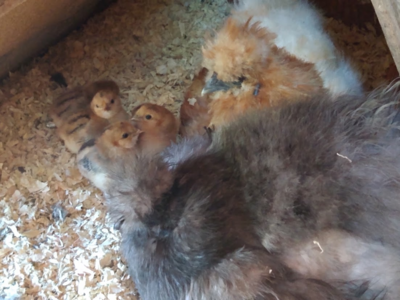
Two silkie mamas with their chicks
But once again, it depends on the bird. Some chickens just aren't meant to be mothers, and others won't stop going broody. Often times, chickens from hatcheries have had some the mothering instinct bred out of them. But I do not mean to say that silkies from hatcheries won't go broody; it really comes down to the bird.
16. Silkies are amazing and make great pets!
True! I love my silkies, they are so friendly and cute. If you want some snuggle-chickens, I recommend silkies! If you want pets for your kids, I recommend silkies! If you want special and unique chickens, I recommend silkies!
If you want to chat with other silkie keepers or have silkie-specific questions, check out this thread: https://www.backyardchickens.com/threads/silkies-they’re-simply-spectacular.1334299/#post-21797229
I hope this article helps you understand the world of silkies better! Have fun chickening!
Any other silkie myths you have heard? Please comment below or send me a PM!

